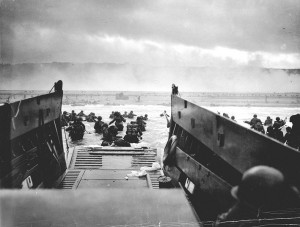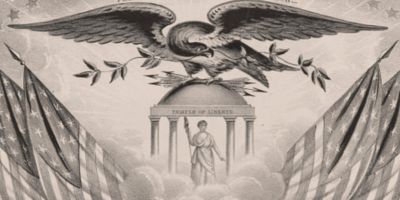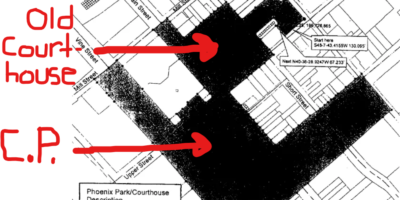By Beth Connors-Manke
In June 1940, George Orwell (of Animal Farm and 1984 fame) wrote in “War-time Diary”:
“It is impossible even yet to decide what to do in the case of German conquest of England. The one thing I will not do is to clear out, at any rate not further than Ireland, supposing that to be feasible. If the fleet is intact and it appears that the war is to be continued from America and the Dominions, then one must remain alive if possible, if necessary in the concentration camp. If the U.S.A. is going to submit to conquest as well, there is nothing for it but to die fighting, but one must above all die fighting and have the satisfaction of killing somebody first.”
Having served in the Indian Imperial Police in Burma and fought in the Spanish Civil War, Orwell was a thoroughly political writer. During World War II, he was a member of the British Home Guard and wrote for the BBC. His “War-time Diary” shows that he was paying close attention to the war and the information released — or not released — in the daily papers. Like other political thinkers in his circle, he was trying to figure out the war, as it was happening.
And one thing that seemed possible to Orwell, at least in June 1940, was that both England and the U.S. could buckle and accept a German occupation. A startling thought for those of us who long ago accepted the story of World War II laid down in the history books: the story of German advancement, European pacification, English determination, and American vengeance. Weren’t we always destined to triumph — through great sacrifice — on D-Day, when Allied forces gained Normandy?

U.S. Coast Guard-manned USS Samuel Chase disembarks troops of the U.S. Army's First Division on the morning of June 6, 1944 (D-Day) at Omaha Beach. Photo by Robert F. Sargent, U.S. Coast Guard.
Just before the D-Day invasion, General Eisenhower certainly spoke in terms of destiny:
“Soldiers, Sailors and Airmen of the Allied Expeditionary Force! You are about to embark upon a great crusade, toward which we have striven these many months. The eyes of the world are upon you. The hopes and prayers of liberty loving people everywhere march with you. In company with our brave Allies and brothers in arms on other fronts, you will bring about the destruction of the German war machine, the elimination of Nazi tyranny over the oppressed peoples of Europe, and security for ourselves in a free world…. The free men of the world are marching together to victory!”
And that’s how we say it happened. Whatever private worries Orwell may have had, Eisenhower’s public rhetoric proclaimed that the Nazis weren’t going to get to American shores.
“The war is to be continued from America”
My husband grew up in Seven Hills, Ohio, a suburb of Cleveland. His high school, which opened in 1968, was christened “Normandy,” its mascot “The Invaders.” The legacy of D-Day and the Allied triumph was a banal part of his education, as they chanted for the Invaders at football games and defended their school’s honor in teenage stand-offs. I can’t imagine Nazis ever taking over Cleveland, even if New York, Boston, and Miami had given up.
I say this only partially tongue-in-cheek. One of the things Orwell mulled over in his “War-time Diary” was which type of people, which socio-economic classes, were most likely to sell-out during a German occupation. He believed that while the working class might not be paying close enough attention to how the war was unfolding, it would probably, in the end, revolt under German rule. In Orwell’s view, it was the British upper classes who would roll over for the Germans, as long as the aristocracy got to keep some of its power.
With a strong immigrant and working class culture, gritty Clevelanders would not have suffered long the yoke of Nazi governance.

Pile of grit with Cleveland skyline in the distance. Industry such as steel used to be the life blood of Cleveland. Photo by Brian Connors-Manke.
Ironically, that Cleveland culture allowed an alleged concentration camp guard to make his home in northeast Ohio. About ten years before Normandy High School opened its doors, Ukrainian-born John Demjanjuk gained U.S. citizenship. He worked in the American auto industry and eventually settled in Seven Hills. So while my husband was imbibing his history lessons about American victory in World War II, he was probably also passing Demjanjuk, that concentration camp guard, on the sunny streets of quiet, suburban Seven Hills.
So, at least in a small way, they did make it to American shores.
“One must remain alive if possible”
The Demjanjuk story is a long and labored one. In 1942, he was captured by the Germans while serving in the Red Army. From there, Demjanjuk says he spent the rest of the war in a prisoner of war camp. Others, including the U.S., Israel, and Germany, believe that after his capture Demjanjuk served as a guard in Nazi camps, including an extermination camp in Poland.
Between 1977 and 2011, the Red soldier/death camp guard/Ohio autoworker was stripped of his American citizenship twice and brought to trial in Israel, the U.S., and, most recently, Germany. Famously, Demjanjuk was convicted in 1988 by Israel of being Treblinka death camp guard “Ivan the Terrible”; in 1993 the Israeli Supreme Court overturned the conviction.
Now 91, Demjanjuk has been sentenced to five years in a German prison for his war-time activities, although his health is so bad that he is awaiting his trial appeal from a nursing home.
The tragic, if not uncomfortable, truth seems to be that Demjanjuk lived out Orwell’s pledge — “one must remain alive if possible, if necessary in the concentration camp” — although not in the way the writer intended. Evidently, Demjanjuk stayed alive in German camps by being “one of them.” The recent German case against him saw the cost of that effort at more than 28,000 lives: the number of people who died at Sobibor camp in Nazi-occupied Poland while Demjanjuk was allegedly a guard there. The Ohio autoworker “stayed alive” in the U.S. by being one of us.
It seems that, since he was a 22-year-old Ukrainian in the Red Army, Demjanjuk has been doing whatever necessary to stay alive — and out of prison stripes.
How Nazis Got Here
Demjanjuk is one of perhaps thousands of post-World War II émigrés tied to the “German war machine,” as Eisenhower called it, who found refuge in America. Although Demjanjuk obscured his past as a low-level death camp guard in order to pass into the U.S., some Nazis made it here on the strength of their World War II credentials. While the Justice Department sometimes worked to deport those with Nazi ties, other arms of the government were recruiting and shielding former Nazis.
In fact, the Central Intelligence Agency (C.I.A.) employed some Nazis for American post-war intelligence, harboring them in the U.S. The government also developed “Operation Paperclip,” a program for extricating scientists who had worked in Nazi Germany in order to mine their expertise during the Cold War.
So, one answer to how Nazis got here is that we brought them.
Another answer is human changeability, our aptitude for stepping in line with any power structure encompassing us. We adapt — for better or for worse. When world politics reoriented itself after World War II, the U.S. was willing to look away from some Nazi atrocities in favor of fighting Soviet totalitarianism. Nazi scientists were willing to work for the U.S.; Demjanjuk was willing to make a life as an autoworker.
In his diary, Orwell is talking himself out of this type of pragmatism. The writer says he won’t flee, won’t turncoat, will stay loyal to his reasonably just, although tremendously flawed, England. He will refuse to adapt. This isn’t a simplistic loyalty, as Orwell hoped for socio-economic revolution in Britain and firmly opposed fascism.
Orwell is telling himself (and us) don’t be a Demjanjuk, a cog doing anything to survive; don’t be a Henri Philippe Pétain, the French national hero who collaborated with the Germans in their occupation of France; don’t be a government trading away ethics for military expertise. Don’t be willing to fit yourself to any ideology just because it may have the upper hand.
“Have the satisfaction of killing somebody first”
Around the time Demjanjuk’s German trial was in the news, my husband and I were in Warsaw, Poland. While there, we learned that Poland suffered some of the worst human losses during World War II (remember Demjanjuk served in concentrations camps in Poland), and Warsaw itself was nearly leveled by the Germans before they left. (Sources say upwards of eighty percent of the city was destroyed.)
A few years before they demolished and abandoned the city, the Nazis laid to waste the Jewish Ghetto, an area into which they had crowded between 300,000 and 400,000 Jews. Prior to the war, Warsaw had been home to the largest Jewish population in Europe, and second largest in the world after New York city. In 1940, the Nazis forced Jews from Warsaw and surrounding areas into the ghetto and then sealed it off, creating a separate, horribly unhealthy, and impoverished zone.
In 1943 when the Germans began another stage of “liquidating” the ghetto by deporting ghetto residents, a planned, armed Jewish revolt began. The Warsaw Ghetto Uprising, as it is now called, continued over several months until the ghetto was razed and the resistance fighters defeated.
The bunker in which resistance leaders are said to have hid is all that remains of the ghetto.

Bunker in Warsaw Ghetto, the only remaining building after Nazis razed the ghetto. Here the last of the Jewish resistance fighters hid. Photo by Brian Connors-Manke.
My husband got to visit the bunker, so he told me about it as we whittled down a large plate of pierogies. He’d read in our tour book that organizers of the uprising had committed suicide in the bunker when the Nazis found them. (Note: I haven’t found this information confirmed elsewhere yet.)
Being in Warsaw, surrounded by its profound history, I kept wondering what it had felt like to be alive during the war, how it felt to be in a world both brutal and unpredictable — the world Orwell was trying to make sense of in his diary.
This led me to think hard about the possibility that the Jewish resistance fighters had committed suicide. What would that choice mean? Would they have been granting themselves dignity by choosing their own deaths? Would they have been simply avoiding the torture that would surely come after their capture? Were they protecting others and their secrets by taking their lives? All of these reasons? None of them?
I asked my husband what he might have done in the situation. His answer: to go down guns blazing, or, in Orwell’s words, he’d “have the satisfaction of killing somebody first.” He didn’t think he’d commit suicide so much as force the Nazis to kill him first, hoping that he’d take some German soldiers with him.
At first this sounded like American bravado to me. But when I consider my husband’s answer in light of Orwell’s comments and Demjanjuk’s choices, I see it differently. “Kill or be killed,” or “kill and be killed,” touted under any political banner, is pragmatic more than anything else. It wouldn’t have been noble on Orwell’s part and may not have been purely evil on Demjanjuk’s.
But if it’s true that the Jewish resistance fighters took their own lives in that bunker, what do we make of that decision? They had surely killed Germans during the course of the uprising, but they refused the “be killed” part of the equation. Part of me was drawn to that stand. To die, yes, but to refuse to be murdered. It feels like there’s some dignity in that refusal.
Resist Humiliation
We shouldn’t be so surprised by Demjanjuk’s story. As painful as it may be to consider, it could have been my story or yours. We’re essentially changeable creatures, who may, when push comes to shove, accept any form of violence that keeps us alive.
Mahatma Gandhi exhorted students of non-violent resistance to oppose humiliation, the process by which individuals or a people is daily degraded, the means by which oppressors refuse to recognize the dignity of others. If the Nazi program was about anything, it was about humiliation.
In some ways, we’ve cultivated that on our shores, in our pain, anger, and grief since 9/11. When I heard that people cheered the death of bin Laden (even buying t-shirts to celebrate), I see that as a humiliation. That’s also Americans wanting (vicariously) to have the satisfaction of killing. When our own Senator McConnell wants to have terror suspects found in Kentucky tried in Guantanmo rather than stateside, I see that as the war machine working, refusing the values of our democracy. When I consider the federal government’s post 9/11 policy on citizens’ civil liberties and our treatment of prisoners at Guantanamo Bay, I see a country conceding to surveillance and violence, a country changeable.





Leave a Reply